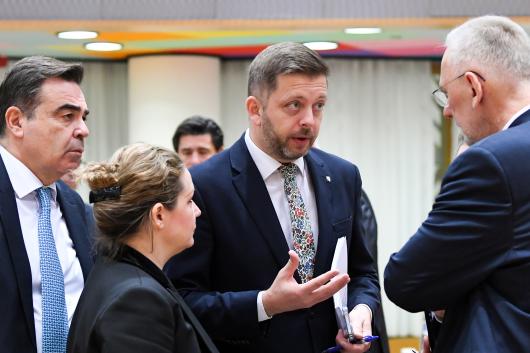
Success of the Czech Presidency: Schengen to be extended to Croatia
08.12.2022 / 20:15 | Aktualizováno: 20.12.2022 / 16:14
EU Member States unanimously approved the extension of Schengen to Croatia at the Justice and Home Affairs Council today. This is an extraordinary success for the Czech Republic at the end of its Presidency of the Council of the EU. Ministers also endorsed the Czech Presidency's concept for the future reform of EU migration policy and discussed the situation in Ukraine.
Schengen will expand to 27 states from 1 January 2023. The current 22 EU member states, Iceland, Norway, Switzerland and Liechtenstein will be newly joined by Croatia. The EU interior ministers agreed on the decision today, 8 December 2022, at a meeting of the Justice and Home Affairs Council in Brussels.
The extension of the free movement area to Croatia was one of the priorities of the Czech Presidency of the Council of the EU. "It is a great success and the culmination of our work throughout the Presidency. I thank all those who participated in the difficult negotiations," said Interior Minister Vít Rakušan. The ministers also discussed the way forward for the extension of Schengen to Romania and Bulgaria. Both countries received broad support, but the unanimity condition was not met.
At today's Council meeting, ministers also endorsed the Czech Presidency's concept on the reform of migration and asylum policy. This concept effectively addresses issues of responsibility and solidarity. "The balance between responsibility and solidarity is probably the most sensitive issue in our debates. And we have managed to make important progress," underlined Minister Rakušan.
The concept of the Czech Presidency builds the overall framework on a mandatory but flexible system. "Our concept is based on a system without mandatory quotas, but at the same time offers certainty of support to the affected Member States. This has proved to be the best ingredient for success," the Interior Minister added. This concept will now be translated into concrete legislative texts during the Swedish Presidency so that the whole reform can be approved by mid-2024.
Ministers also agreed on a Council recommendation on strengthening the resilience of critical infrastructure. This is proof that the European Union wants to improve its resilience in the face of increased threats.
At the end of the Council meeting, the priorities of the upcoming Swedish Presidency were presented. It will build on the work of the Czech Presidency and will keep the issue of support to Ukraine high on the agenda. "I wish my Swedish colleagues lots of success. We have tried to do our best and I firmly believe that we are delivering the agenda in an excellent state," the Czech Interior Minister assessed the last Council meeting under the Czech Presidency.




